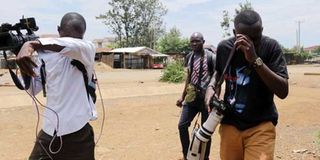Train, equip journalists for poll coverage

Journalists react after they were teargassed by anti-riot police who did not want to be filmed during a demonstration in Kisumu on October 13, 2017.
What you need to know:
- Journalists who will spend most of their time on the ground will require a lot of support to succeed in their work.
- They will require training on basic election reporting, ethics in election coverage, factchecking and digital journalism.
As the elections draw near, preparations for election coverage are in top gear in nearly all news media organisations. While strategies for election coverage are critical, journalists who will spend most of their time on the ground interacting with the public, candidates and electoral institutions will require a lot of support to succeed in their work.
One key area – and perhaps the most critical – is that journalists covering elections will need a lot of training to equip them with the necessary skills and knowledge. A good number of journalists will be covering the elections for the first or second time and it is important to retool and reskill them in various capacities.
They will require training on basic election reporting, ethics in election coverage, factchecking and digital journalism, among other areas of support. Simple but powerful skills such as correct use of their phones, cameras and recorders in the news-gathering process must not be left out.
They will also need a good grounding on technology and elections; the good, the bad and the ugly, and how to report on instances when technology has been used or misused in the case of elections.
Young journalists must be supported through mentorship and apprenticeship and be provided with opportunities to grow their election reporting skills. Female journalists must also be encouraged and supported to take on bigger roles and responsibilities in election coverage.
Safety and security
The second key area is ensuring their safety and security. Journalists are increasingly becoming targets of physical violence and online abuse. They are increasingly becoming victims of violent threats, smear campaigns and verbal abuse from people who intend to silence journalists and suppress the truth.
It is not enough to train journalists on how to protect themselves online, it is equally important to condemn and address the harassment of journalists and act against perpetrators of such. It is also critical to support journalists who have experienced harassment with legal assistance and ensure that perpetrators do not get away with this.
Recent global research on 901 journalists from 125 countries showed that female journalists are experiencing “unprecedented levels” of online abuse. As we near the elections, there will be a need to protect female journalists from online hate to allow them to carry out their duties without fear.
Journalists must also be provided with the necessary tools and equipment required as they go out to report in the field. For journalists to adequately do their jobs, newsrooms will need to set aside adequate budgets to ensure their journalists are comfortable while on the job. This might include extra resources for transport, accommodation, masks, water and other seemingly simple but important things that will make a world of a difference.
Lastly, we must not forget to provide psychosocial support for journalists by ensuring access to counselling and mental health support to ensure they are adequately debriefed and supported during the tough campaign and elections period.
The writer is the Director, Innovation Centre, at Aga Khan University; [email protected]





